2017年新外研版初中英语九年级英语下Module 6 全模块精美导学案
外研版初三英语下册Module 6 教案

外研版初三英语下册Module 6 教案www.5ykj.com 外研版初三英语下册module6教案moDULE6TEAcHINGPLANmodule6Lookatyourself!一、题材内容本模块的话题是“健康生活”,内容涉及“出行安全”、“生活习惯”、“健康饮食”、“充足睡眠”、“乐观心态”和“远离香烟和毒品”等,语言技能和语言知识都是依据中心话题展开的。
第一单元从观察图片入手,引入本课主题。
对话以长途旅行中发生的事故为话题展开,内容贴近学生的生活,对学生处理突发事故也有指导意义。
对话中涉及了多种时态,突出了本模块的语法内容。
第二单元通过阅读健康生活六原则来引导教育学生珍爱生命以及如何安全、健康地生活,在完成阅读活动的过程中培养学生分析和推理的阅读技能。
本模块的写作是仿照阅读并结合自身的经历,写出自己的健康生活原则。
第三单元主要复习本模块的语法、词汇,扩大阅读量并完成模块任务。
本模块语法重点为复习学过的时态。
使学生在无意识的情况下掌握语言结构,既学习语言知识,又感悟语言功能,真正做到了语法为语义表达服务。
本模块的Aroundtheworld栏目介绍了laughterforhealth,通过讨论可以加深对学习的兴趣,既可学习语法,又可培养叙述能力。
教学中教师应随时随地灵活利用各种素材组织教学过程和内容。
充分调动学生的积极性。
教学目标)语言知识:语音能朗读不同时态的句子,注意意群的停顿。
词汇Fever,flu,knee,wound,miss,trip,improvement,oncoming ,couch,expert,require,fit,amount,weight,effect,cook er,shock,hit,glad,breathe,cancer,fix语法复习学过的时态。
功能谈论健康生活。
话题以“健康生活”为话题。
2)语言技能:听能听懂有关事故发生的时间、地点、现场人物和事故发生的过程;能根据所听细节信息进行推断。
外研版英语九年级下册Module 6 Unit 2 You should always - go with someone导学案设计
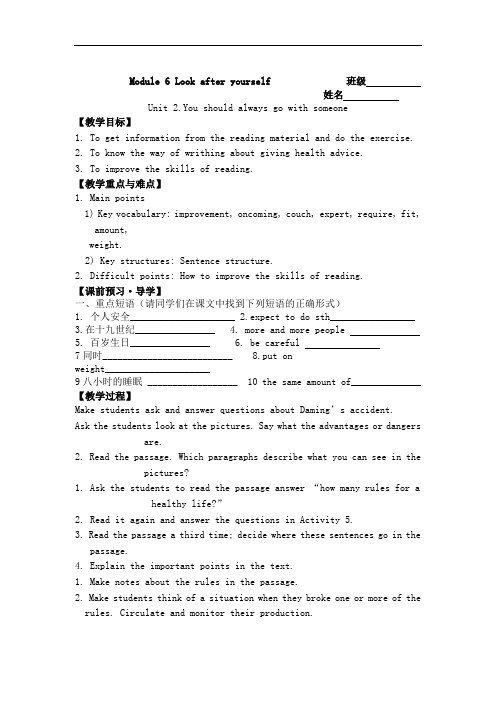
Module 6 Look after yourself 班级姓名Unit 2.You should always go with someone【教学目标】1. To get information from the reading material and do the exercise.2. To know the way of writhing about giving health advice.3. To improve the skills of reading.【教学重点与难点】1. Main points1) Key vocabulary: improvement, oncoming, couch, expert, require, fit,amount,weight.2) Key structures: Sentence structure.2. Difficult points: How to improve the skills of reading.【课前预习·导学】一、重点短语(请同学们在课文中找到下列短语的正确形式)1. 个人安全_____________________2.expect to do sth_________________3.在十九世纪________________4. more and more people5. 百岁生日________________6. be careful7同时__________________________ 8.put onweight_____________________9八小时的睡眠 __________________ 10 the same amount of______________ 【教学过程】Make students ask and answer questions about Daming’s accident.Ask the students look at the pictures. Say what the advantages or dangers are.2. Read the passage. Which paragraphs describe what you can see in thepictures?1. Ask the students to read the passage answer “how many rules for ahealthy life?”2. Read it again and answer the questions in Activity 5.3. Read the passage a third time; decide where these sentences go in thepassage.4. Explain the important points in the text.1. Make notes about the rules in the passage.2. Make students think of a situation when they broke one or more of the rules. Circulate and monitor their production.3. Write a composition describing your rules for a safe and healthy life. Use the examples in Activity 6 and the situations you made in Activity7 for help.4. Make some students read their productions.Revise the words and sentences in the unit.【课内练习】单句改错,下列句中有一处错误,请指出并改正。
九年级英语下册Module6EatingtogetherUnit3Languageinuse导学案无答案新版外研版201712201101
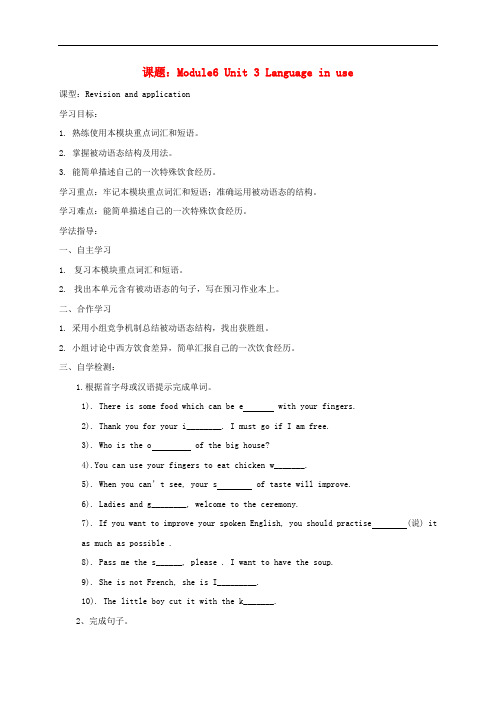
课题:Module6 Unit 3 Language in use课型:Revision and application学习目标:1. 熟练使用本模块重点词汇和短语。
2. 掌握被动语态结构及用法。
3. 能简单描述自己的一次特殊饮食经历。
学习重点:牢记本模块重点词汇和短语;准确运用被动语态的结构。
学习难点:能简单描述自己的一次特殊饮食经历。
学法指导:一、自主学习1.复习本模块重点词汇和短语。
2.找出本单元含有被动语态的句子,写在预习作业本上。
二、合作学习1. 采用小组竞争机制总结被动语态结构,找出获胜组。
2. 小组讨论中西方饮食差异,简单汇报自己的一次饮食经历。
三、自学检测:1.根据首字母或汉语提示完成单词。
1). There is some food which can be e with your fingers.2). Thank you for your i________. I must go if I am free.3). Who is the o of the big house?4).You can use your fingers to eat chicken w_______.5). When you can’t see, your s of taste will improve.6). Ladies and g________, welcome to the ceremony.7). If you want to improve your spoken English, you should practise (说) itas much as possible .8). Pass me the s______, please . I want to have the soup.9). She is not French, she is I_________.10). The little boy cut it with the k_______.2、完成句子。
外研版初三英语下册Module 6 教案

外研版初三英语下册Module 6 教案一、教学背景初三下学期是学生即将进入中考阶段的关键时期,针对英语科目的学习,教师有必要制定一套合理的教学计划,提高学生的英语综合能力。
本教案是外研版初三英语下册Module 6 的教学计划,通过设计合理的教学内容和方式,帮助学生全面掌握相关知识和技能,为他们顺利备战中考提供支持。
二、教学目标•知识目标:通过本模块的教学,学生应能够学会描述人物的外貌特征和性格特点;掌握“like”和“be like”的用法;学会运用所学知识描述喜欢的和不喜欢的事物。
•能力目标:培养学生的听、说、读、写能力,增加他们的英语实际运用能力,提高他们的语言表达和沟通能力。
•情感目标:通过丰富多样的教学活动,激发学生对英语学习的兴趣和自信心,培养他们积极参与课堂活动和合作学习的习惯。
三、教学内容本教案主要包括以下教学内容:1.单词学习:描述人物的外貌特征和性格特点的相关词汇,如tall, short, long hair, curly hair等。
2.语法学习:掌握“like”和“be like”的用法,描述喜欢的和不喜欢的事物。
3.句子表达:运用所学知识,描述人物的特征和兴趣爱好。
四、教学重点和难点•教学重点:培养学生描述人物的能力,学会用英语表达喜欢和不喜欢的事物。
•教学难点:掌握“like”和“be like”的用法的差异及正确运用。
五、教学准备1.音频设备:用以播放相关听力材料。
2.教学投影仪:用以呈现教案中的相关课件。
3.板书准备:准备好与本模块相关的单词和句型。
六、教学过程1. 导入新课•利用图片或演示视频展示不同的人物形象,引发学生对外貌特征的讨论,激发他们表达的兴趣。
2. 单词学习•展示并讲解与外貌特征和性格特点相关的单词与短语。
•带领学生进行词汇练习,巩固所学内容。
3. 语法学习•分别讲解“like”和“be like”的用法,区别两者的应用场景。
•设计相关练习让学生熟练掌握所学语法。
2017年新外研版初中英语九年级英语下Module6全模块精美导学案
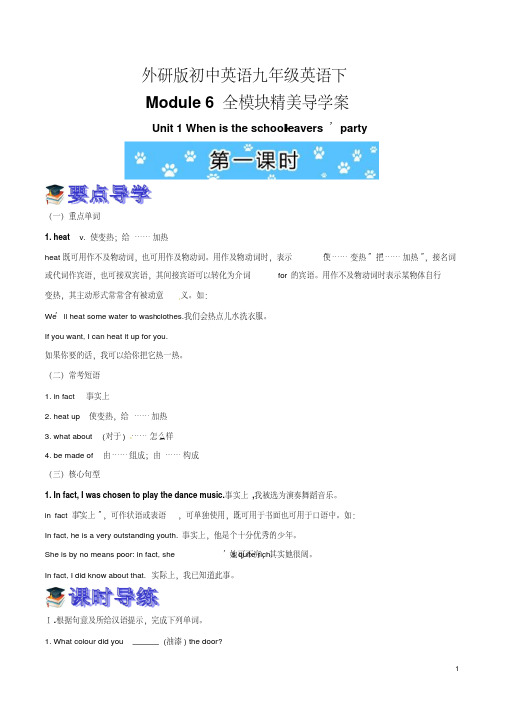
外研版初中英语九年级英语下Module 6 全模块精美导学案Unit 1 When is the school-leavers’party(一)重点单词1. heat v. 使变热;给……加热heat既可用作不及物动词,也可用作及物动词。
用作及物动词时,表示“使……变热”“把……加热”,接名词或代词作宾语,也可接双宾语,其间接宾语可以转化为介词for的宾语。
用作不及物动词时表示某物体自行变热,其主动形式常常含有被动意义。
如:We’ll heat some water to wash clothes.我们会热点儿水洗衣服。
If you want, I can heat it up for you.如果你要的话,我可以给你把它热一热。
(二)常考短语1. in fact 事实上2. heat up 使变热,给……加热3. what about (对于) ……怎么样4. be made of 由……组成;由……构成(三)核心句型1. In fact, I was chosen to play the dance music.事实上,我被选为演奏舞蹈音乐。
事实上”,可作状语或表语,可单独使用,既可用于书面也可用于口语中。
如:in fact“In fact, he is a very outstanding youth.事实上,他是个十分优秀的少年。
她可不穷,其实她很阔。
She is by no means poor: in fact, she’s quite rich.In fact, I did know about that.实际上,我已知道此事。
Ⅰ.根据句意及所给汉语提示,完成下列单词。
1. What colour did you (油漆) the door?2. Don't try to cut your meat with a (叉子)!3. She was happy to accept our (邀请).4. He put the desk (台历) on the shelf.5. That (气球) will burst if you blow it up any more.6. In the past kitchen (刀子) were made in a forge.7. Waiter, please bring me a clean (匙子).8. The eggs are hatched by the (热量) of the sun.9. Have you ever heard that song sung in (意大利人)?10. Give me a (干酪汉堡包), large fries, and a shake.Ⅱ.根据所给汉语完成下列句子,每空一词。
外研版英语(新标准)九年级下册《Module 6 Eating together》教学设计

Step3:
Read the passage in different roles.
1.Read the story in different roles.
Boys = Daming&Tony
We’re all invited.
I was chosen to play the dance music.
I was asked to bring some balloons...
It should be cooked at home.
It’s made with chicken and vegetables.
提高学生们的听力。
二、难点:
能用已经学过的被动语态讨论聚会计划。
教学辅助
多媒体、课本、黑板
教学策略
任务型教学法,交际教学法
教学内容
教学活动Warming-up:Let’s talk!
Is there a school-leavers’party in your school?
课型:阅读
第二单元的课文讲的是西方的用餐习俗。在餐饮习惯的介绍方面,按照开始用餐、进餐过程、用餐结束的顺序进行说明,对于用餐行为和言语的习惯,则同时进行介绍。这有助于读者按照用餐过程学习、掌握这些建议。
课时教学目标
一、核心内容
(一)核心词汇:serve,similar, wing, lady, gentleman, help yourself
二、正确掌握已经学过的被动语态的用法。
三、能用已经学过的被动语态讨论聚会计划。
教学辅助
多媒体、课本、黑板
初三英语Module6导学案

1、课堂设计要有助于学生在课堂上积极参与,有助于他们有效内化知识与信息,复习过程中要重视学习方法的指导,在教学中恰当地渗透中考的信息,拓宽教学内容。
2、英语课堂上教师应及时有效获取学情反馈,有效地进行课前回顾,课堂小结等环节的落实。
外研版初三英语Module6导学案-刘玉彩-青州市逄山初级中学
一、教案背景
1,面向学生:□中学□小学2,学科:初三英语
2,课时:1
3,学生课前准备:
1.初步理解对话大意2.理解记忆新词和短语3.感知理解新语法
二、教学课题
教学方面:
1.会用本课所学四会单词和短语
2.阅读理解对话,并能复述,能用所学词汇,句
■Listen and read.
On page 42 is a conversation among Lingling, Betty, Daming and Tony. They are talking about environmental problems.
Words with commonsuffixes
email,enjoyable,environmental,education,agree,reusable,recycle…
Words with commole, environmental,education, careful,environment,wasteful, reusable, electricity,hopeful,pollution,hopeless
四、教学方法
1.Listening/Speaking
2.Reading/Writing
五、教学过程
说明如何导入该课程,主要教学点的设计,知识拓展等。
Module 6Unit 1
外研版九年级下册英语:Moudle6 导学案
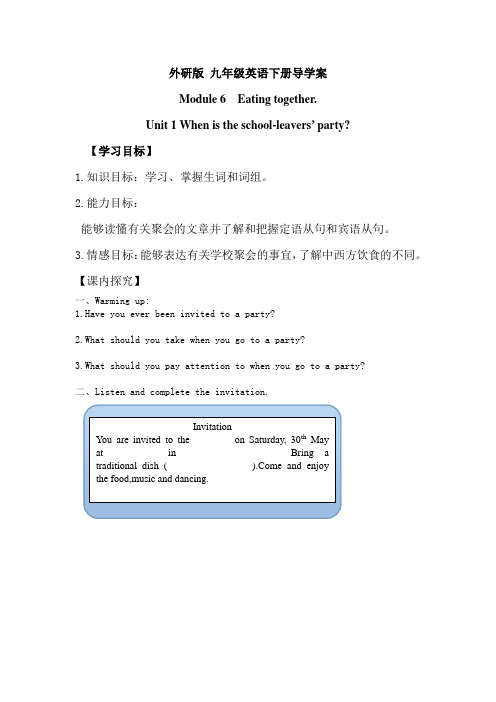
外研版九年级英语下册导学案Module 6 Eating together.Unit 1 When is the school-leavers’ party?【学习目标】1.知识目标:学习、掌握生词和词组。
2.能力目标:能够读懂有关聚会的文章并了解和把握定语从句和宾语从句。
3.情感目标:能够表达有关学校聚会的事宜,了解中西方饮食的不同。
【课内探究】一、Warming up:1.Have you ever been invited to a party?2.What should you take when you go to a party?3.What should you pay attention to when you go to a party?二、Listen and complete the invitation.Listen again and answer the questions.1.What was Daming chosen to do at the school-leavers’ party?2.Where are they going to prepare the food?3.Why does Tony call pizza a traditional English dish?四、Read the passage and finish blanks.【导学探究】1.We’re all invited.我们所有人都被邀请了。
Invited 的常用结构:(1)invite sb. to +名词,意为“邀请某人去......”。
(2)invite sb. to +地点,意为“邀请某人去某地”。
(3)invite sb. to do sth,意为“邀请某人做某事”。
拓展invite的名词形式为invitation,意为“邀请函,请帖”,常与介词to连用。
2.Cheeseburgers are made with hamburgers and cheese.干酪汉堡是用汉堡包和奶酪制成的。
新外研版英语九年级下Module6全模块精美导学案(3份)Unit 3

新外研版英语九年级下Module6全模块精美导学案(3份)Language in useⅠ.单项选择。
( ) 1. ______ I had read the paragraph several times, I still couldn’t understand it.A. AlthoughB. WhileC. When( ) 2. In order to make our city more beautiful,more trees and flowers _____ every year.A. will plantB. should plantC. should be planted( ) 3. —Has anyone taught him how to do it?—Sure. Lots of advice ______, but he hasn’t made a decision.A. was givenB. has been givenC. have been given( ) 4. Lots of books _______ to the poor students in the countryside every year.A. sendB. sentC. are sent( ) 5. These photos ______ by my sister on Mount Tai last summer.A. tookB. are takenC. were takenⅡ.从方框中选择适当的短语,并用其正确形式填空。
1. I want everyone to get to work on time.2. Let's play cards watching television.3. you do not like it, you must do it.4. It takes money to buy a house.5. I'm bit tired. Let's take a short rest.6. Please don't it in front of the children.7. Will you please the light when you leave?8. The bus stop to passenger.9. Both children and adults on Halloween.10. Could you give me on your dishes?Ⅲ.补全对话。
英语九下外研版模块六教案【全模块概论】

日期
教学目标
1)To revise the some tenses that we have learned before.
2)To use the following words and expressions correctly.Such as:fever,flu,knee,wound,miss,trip,expert,require,fit,aqmount,weight,effect,cooker,
shock,hit,glad,breathe,cancer,fix,improvement,oncoming,cough.
3)To talk about the healthy life.
4)To listen to the time,the place,the people and the process of the story and understand the details and make an infer.
5) To read the dialogue about the healthy life.
6)To write own healthy life rules according to own life experience.
重点难点
1))To grasp the key words and expressions.
课时划分
Unit1(1)
Unit 2(2)
Unit 3(1)
Revision(1)
4)To read the dialogue about the healthy life.
新外研版英语九年级下册Module 6 Unit 2导学案

Unit 2 Knives and forks are used for most Western food(一)重点单词1. serve v. 端上(食物和饮料);服侍……进餐serve可指某人为他人服务、干活或为国家尽职等;也可指某人拿出某物款待某人;还可指某人、物、事对某人、某事等“有……用处”“满足……的需要”“适合……的目的”等。
serve可用作不及物动词,也可用作及物动词。
用作及物动词时,接名词、代词、动词不定式作宾语,还可以接双宾语,其间接宾语可转换为介词to的宾语。
如:I think it my duty to serve the people. 我认为为人民服务是我的责任。
There was no one in the shop to serve me.店里没人来招呼我。
(二)常考短语1. be used for 用于2. help yourself 请自便3. not …any more 不再4. at the end of 在……末端;到……尽头5. as soon as 一……就(三)核心句型1. Help yourself. 请自便。
口语中 help oneself 的三种用法(1)用作招呼客人吃东西时的客套话,其意为“请随便吃”“请吃”。
如:Help yourself to the fruit. 吃点水果吧。
Help yourself, Mr. Green. 格林先生,请随便吃。
Make yourself at home, and help yourself to anything you like. 请不Ⅰ.根据句意及所给汉语提示,完成下列单词。
1. Please bring this ______ (先生)a glass of beer.2. He is only too willing to ______ (服务)friends.3. I am sorry I was ______ (生气) at you the other day .4. I saw the beautiful bird on the ______ (翅膀).5. A ______ (西瓜)is red inside and green outside.Ⅱ.单项选择。
外研版英语九年级下册:Module 6 Unit 3 Language in use . 导学设计(
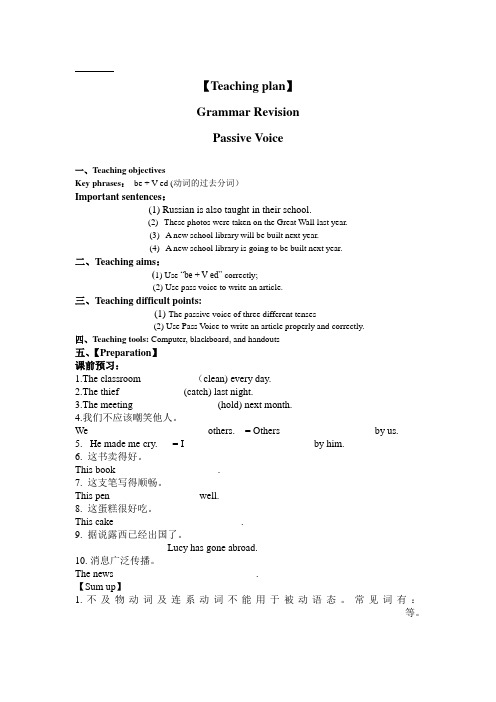
【Teaching plan】Grammar RevisionPassive Voice一、Teaching objectivesKey phrases:be + V-ed (动词的过去分词)Important sentences:(1) Russian is also taught in their school.(2)These photos were taken on the Great Wall last year.(3) A new school library will be built next year.(4) A new school library is going to be built next year.二、Teaching aims:(1) Use “be + V-ed” correctly;(2) Use pass voice to write an article.三、Teaching difficult points:(1) The passive voice of three different tenses(2) Use Pass V oice to write an article properly and correctly.四、Teaching tools: Computer, blackboard, and handouts五、【Preparation】课前预习:1.The classroom _________ (clean) every day.2.The thief ____________ (catch) last night.3.The meeting ________________ (hold) next month.4.我们不应该嘲笑他人。
We _______________________ others. = Others __________________ by us.5.He made me cry. = I _________________________ by him.6. 这书卖得好。
外研版英语九年级下册Module 6 Unit 1 He has had an accident导学案设计
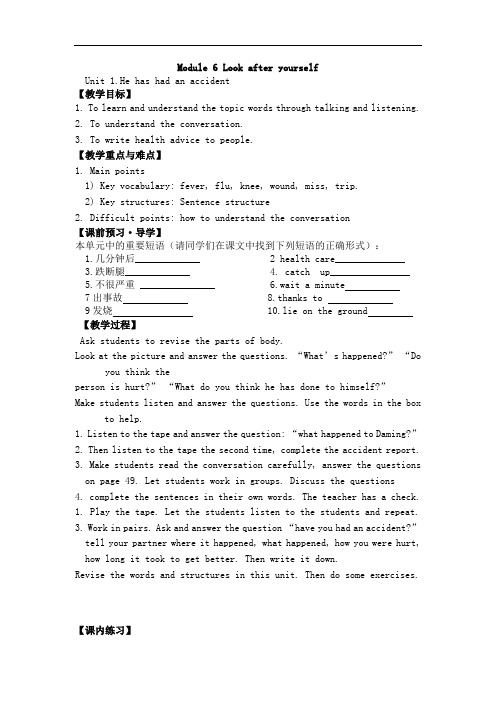
Module 6 Look after yourselfUnit 1.He has had an accident【教学目标】1. To learn and understand the topic words through talking and listening.2. To understand the conversation.3. To write health advice to people.【教学重点与难点】1. Main points1) Key vocabulary: fever, flu, knee, wound, miss, trip.2) Key structures: Sentence structure2. Difficult points: how to understand the conversation【课前预习·导学】本单元中的重要短语(请同学们在课文中找到下列短语的正确形式):1.几分钟后_____________ 2 health care______________3.跌断腿_____________4. catch up________________5.不很严重 _______________6.wait a minute7出事故 8.thanks to9发烧 10.lie on the ground 【教学过程】Ask students to revise the parts of body.Look at the picture and answer the questions. “What’s happened?” “Do you think theperson is hurt?” “What do you think he has done to himself?”Make students listen and answer the questions. Use the words in the box to help.1. List en to the tape and answer the question: “what happened to Daming?”2. Then listen to the tape the second time, complete the accident report.3. Make students read the conversation carefully, answer the questions on page 49. Let students work in groups. Discuss the questions4. complete the sentences in their own words. The teacher has a check.1. Play the tape. Let the students listen to the students and repeat.3. Work in pairs. Ask and answer the question “have you had an accident?” tell your partner where it happened, what happened, how you were hurt, how long it took to get better. Then write it down.Revise the words and structures in this unit. Then do some exercises. 【课内练习】一、用括号中的词语的适当形式填空:(be used for/ as/ by)1. English ________ travelers all over the world.2. The calculators ________ working out math problems.3. The radio ______ a tool in my English study.(pleased ;pleasant)4. He was _____ to see his best friend in the street.5. He has never forgotten the _____ trip in the mountains.(by mistake;by accident)6. Luckily,I found my lost keys _______.7. I’m sorry. I took your book _______.(in a way;in this way;in the way)8. The traffic is busy, you shouldn’t be ______.9. _____ he was sorry about the thing.10. ______ you can work out the math problem easily.【课内拓展】二、根据汉语完成句子1. 他正沿着城墙走,一下绊倒了跌倒在边上。
外研版英语九年级下册Module 6 Unit 3 Language in use导学案设计
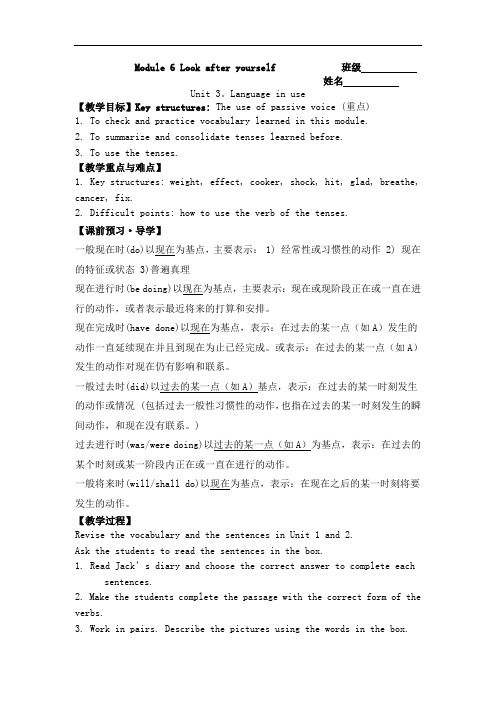
Module 6 Look after yourself 班级姓名Unit 3。
Language in use【教学目标】Key structures: The use of passive voice (重点)1. To check and practice vocabulary learned in this module.2. To summarize and consolidate tenses learned before.3. To use the tenses.【教学重点与难点】1. Key structures: weight, effect, cooker, shock, hit, glad, breathe, cancer, fix.2. Difficult points: how to use the verb of the tenses.【课前预习·导学】一般现在时(do)以现在为基点,主要表示: 1) 经常性或习惯性的动作 2) 现在的特征或状态 3)普遍真理现在进行时(be doing)以现在为基点,主要表示:现在或现阶段正在或一直在进行的动作,或者表示最近将来的打算和安排。
现在完成时(have done)以现在为基点,表示:在过去的某一点(如A)发生的动作一直延续现在并且到现在为止已经完成。
或表示:在过去的某一点(如A)发生的动作对现在仍有影响和联系。
一般过去时(did)以过去的某一点(如A)基点,表示:在过去的某一时刻发生的动作或情况 (包括过去一般性习惯性的动作,也指在过去的某一时刻发生的瞬间动作,和现在没有联系。
)过去进行时(was/were doing)以过去的某一点(如A)为基点,表示:在过去的某个时刻或某一阶段内正在或一直在进行的动作。
一般将来时(will/shall do)以现在为基点,表示:在现在之后的某一时刻将要发生的动作。
【教学过程】Revise the vocabulary and the sentences in Unit 1 and 2.Ask the students to read the sentences in the box.1. Read Jack’s diary and choose the correct answer to complete eachsentences.2. Make the students complete the passage with the correct form of the verbs.3. Work in pairs. Describe the pictures using the words in the box.4. Make the students complete the conversation with the words and expressions.1. Play the tape. Listen and answer the questions. “Where does theconversation takeplace? Who is talking? What’s the problem?”2. Make students read the passage again and choose the best answer. The teacher has a check.Make s tudents read the passage. Learn “laughter for health”. Giving health advice to people.2. Talk and have a discussion about the problems in groups.Make students say their opinions.3. Write some advice for each problem on the board.【课内练习】选择填空1. ---Wow, what a cool computer! How long have you _____ it? ---Half a month.A. boughtB. gotC. hadD. chosen2. ---What’s wrong with the food? --- It ______ terrible.A. is tastingB. is tastedC. tastesD. tasted3. ---Mike, you ___ your bike outside the shop all night long. --- My god! ___A. forgot, So did IB. forgot, So I didC. left; So did ID. left, So I did4. Please show me the watch that you want _______.A. it repairedB. to have repairedC. to have it repairedD. to repair it5. Be careful. The train ______.A. will comeB. has comeC. comesD. is coming6. Look at those clouds. It _____ soon, I'm afraid.A. is going to rainB. is rainingC. will rainD. won't rain7. _____ you _____ the text yet? Yes, we _____ it two hours ago.A. Did…copy…didB. Have… copied…haveC. Have… copied… didD. Did …copy…had8. My brother _______ college for over three years.A. has gone toB. has been toC. has been inD. has been for9. We _____ out by that time that he ____ a thief for a long time.A. had found…had beenB. had found…wasC. found…had beenD. found…was10. My life _____ a lot in the last few years.A. changesB. changedC. has changedD. will change【课后反思】____________________________________________________________________ ____________________________________________________________________ ____________________________________________________________________ ____________________________________________________________________ ____。
外研社初中英语九年级下册:Moudle6 导学案
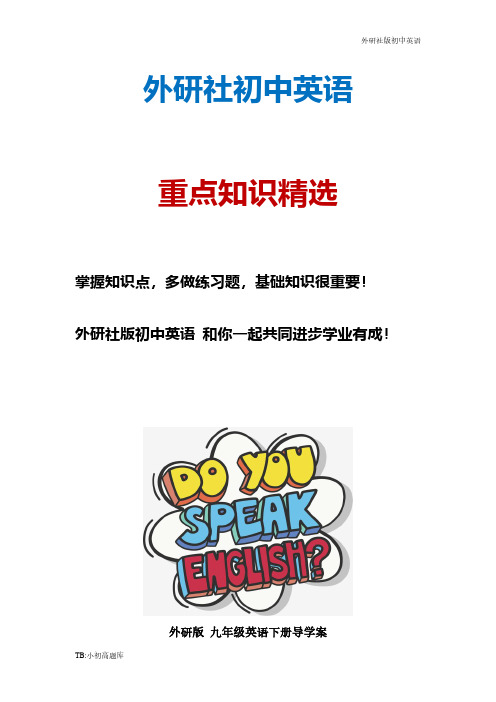
外研社初中英语重点知识精选掌握知识点,多做练习题,基础知识很重要!外研社版初中英语和你一起共同进步学业有成!外研版九年级英语下册导学案用。
2.Cheeseburgers are made with hamburgers and cheese.干酪汉堡是用汉堡包和奶酪制成的。
be made with意为“用......制成”。
拓展:(1)be made of与be made from 都意为“用......制成,由......构成”,前者指成品中可看出原材料,通常指原材料发生了物理变化。
而后者通常指成品失去了原材料的外形或特征,或原材料在制作过程中发生了化学变化,不能辨认出原材料。
【当堂达标】一、单项选择1.Hot and sour soup is made______chicken or pork and vegetables.A .in B.with C.by D.to2.---Tell me one thing you’re proud of in your junior high school,Tony?---I_____as captain of the school football team. ABCDA.chooseB.choseC.am chosenD.was chosen3.It’s no good_____at the moment.We should come up with some dishes.A.cryB.cryingC.to cryD.to crying4.(2014 湖北咸宁)---Food safety is very important.---So some rules_____to stop people polluting food.A.must makeB.must be madeC.must makeD. be madeLunch is usually eaten at about 1 pm.Knives and forks are used for most Western food.You will be served by someone who asks,“Would you like some...?”【当堂达标】( ) 1 The People's Republic of China ___ on October 1, 1949.A. foundB. was foundedC. is foundedD. was found ( ) 2 English ____ in Canada.A. speaksB. are spokenC. is speakingD. is spoken ( )3 This English song___ by the girls after class.A. often singsB. often sangC. is often sangD. is often sung ( ) 4 This kind of car ___ in Japan. A, makes B. made C. is making D. is made ( ) 5 New computers ___ all over the world.A. is usedB. are usingC. are usedD. have used 二、 ( ) 1 Our room must ___ clean.A. keepB. be keptC. to be keptD. to keep ( ) 2 -I'd like to buy that coat. -I'm sorry. ___.A. it soldB. it's sellingC. It's been soldD. it had been sold ( ) 3 A new house ___ at the corner of the road.A. is buildingB. is being builtC. been builtD. be building ( ) 4 The key ___ on the table when I leave.A. was leftB. will be leftC. is leftD. has been left ( ) 5 Doctors ___ in every part of the world.A. needB. are needingC. are neededD. will need ( ) 6 His new book___ next month.A. will be publishedB. is publishingC. is being publishedD. has been published三、( ) 1 Japanese ___ in every country.A. is not spokenB. are spokenC. is speakingD. is not speaking ( ) 2 These papers___ yet.A. have not writtenB. have not been writtenC. has not writtenD. has not been written ( ) 3 The sports meet ___ be held until next week.A. didn'tB. won'tC. isn'tD. doesn't四、( ) 1 -My shoes are worn out.A. Can't they be mended?B. Let me have a look at it.C. How much do they cost?D. Can't they mended? ( ) 2 ___ the watch been repaired yet? I badly need it. A. Does B .Has C. Is D. Are ( ) 3 ___ these desks be needed?A. WillB. AreC. HasD. Do 五、 ( ) 1 Why ___ to talk about it yesterday?A. didn't a meeting holdB. wasn't a meeting heldC. wasn't held a meetingD. a meeting wasn't held ( ) 2 Who was the book___?A. writeB. wroteC. writtenD. written by ( ) 3 Where ___ these boxes made?A. wasB. wereC. isD. am 六、 ( ) 1 The flowers___ often.A. must be waterB. must be wateredC. must wateredD. must water ( ) 2 The books may___ for two weeks.A. be keptB. be borrowedC. KeepD. borrow( ) 3 The broken bike____ here by Mr Smith.A. can mendB. can mendedC. can be mendD. can be mended七、 ( ) 1 The old bridge in my hometown___ next month.A. is going to be rebuiltB. will rebuiltC. are going to be rebuiltD. are going to rebuilt ( ) 2 The play ___ at the theater next Sunday.A. is going to be shownB. will shownC. will showD. is shown ( ) 3 The old stone bridge ___ next week.A. is going to be rebuiltB. will be rebuildC. are going to be rebuiltD. will rebuild 八、 ( ) 1 Now these magazines___ in the library for a long time.A. have keptB. are keepingC. have been keepingD. have been kept ( ) 2 The pot ___ for ___ hot water.A. used; keepingB. was used; keepingC. is used; to keepD. are used; keep ( ) 3 Tea ___ in the south of China.A. growsB. is grownC. were grownD. will grow ( ) 4 The bridges___ two years ago.A. is builtB. builtC. were builtD. was built ( ) 5 Wet clothes are often ___ up near a fire in rainy weather.A. hangB. hanged C . hanging D. hung 九、 ( ) 1 The river smells terrible. People must ___ dirty things into it.A. be stopped to throwB. be stopped from throwingC. stop to throwD. stop from throwing ( ) 2 The teapot ___ water.A. is filled withB. filled ofC. fulling ofD. filled ( ) 3 Old people must be looked after well and ___ politely.A. speak toB. spokenC. speakD. spoken to ( ) 4 Old people must ___.A. look after wellB. be looked well afterC. looked well afterD. be looked after well 十、 ( ) 1 Newly-born babies___ in hospital.A. are taken good careB. are taken good care ofC. take good care ofD. take good care ( ) 2 They were___ at the sudden noise.A. frighteningB. frightenedC. frightenD. frightens ( ) 3 These walls___ stone.A. are made ofB. made of uC. are made intoD. made intoU1 当堂达标答案:1-5 BDBBDU2 当堂达标答案:一、1.more important 2.twentieth 3.Indian 4.recently 5.is spoken二、1.at least 2.is used by 3. are used as 4.Even though 5.as common as三、1.everyone/everybody 2.night 3.enough 4.time 5. put 6. breakfast 7. usually 8. smile 9. world 10. rememberU3答案: 1. 1-5 B D D D C 2. 1-6 B C B B C A 3. 1-3 A B B 4. 1-3 A B A 5. 1-3 B D B 6. 1-3 B A D 7. 1-3 A B A 8. 1-5 D B B C D 9. 1-4 B A D D 10. 1-3 B B A相信自己,就能走向成功的第一步教师不光要传授知识,还要告诉学生学会生活。
- 1、下载文档前请自行甄别文档内容的完整性,平台不提供额外的编辑、内容补充、找答案等附加服务。
- 2、"仅部分预览"的文档,不可在线预览部分如存在完整性等问题,可反馈申请退款(可完整预览的文档不适用该条件!)。
- 3、如文档侵犯您的权益,请联系客服反馈,我们会尽快为您处理(人工客服工作时间:9:00-18:30)。
外研版初中英语九年级英语下Module 6 全模块精美导学案Unit 1 When is the school-leavers’party(一)重点单词1. heat v. 使变热;给……加热heat既可用作不及物动词,也可用作及物动词。
用作及物动词时,表示“使……变热”“把……加热”,接名词或代词作宾语,也可接双宾语,其间接宾语可以转化为介词for的宾语。
用作不及物动词时表示某物体自行变热,其主动形式常常含有被动意义。
如:We’ll heat some water to wash clothes.我们会热点儿水洗衣服。
If you want, I can heat it up for you.如果你要的话,我可以给你把它热一热。
(二)常考短语1. in fact 事实上2. heat up 使变热,给……加热3. what about (对于) ……怎么样4. be made of 由……组成;由……构成(三)核心句型1. In fact, I was chosen to play the dance music.事实上,我被选为演奏舞蹈音乐。
in fact“事实上”,可作状语或表语,可单独使用,既可用于书面也可用于口语中。
如:In fact, he is a very outstanding youth.事实上,他是个十分优秀的少年。
She is by no means poor: in fact, she’s quite rich. 她可不穷,其实她很阔。
In fact, I did know about that.实际上,我已知道此事。
Ⅰ.根据句意及所给汉语提示,完成下列单词。
1. What colour did you (油漆) the door?2. Don't try to cut your meat with a (叉子)!3. She was happy to accept our (邀请).4. He put the desk (台历) on the shelf.5. That (气球) will burst if you blow it up any more.6. In the past kitchen (刀子) were made in a forge.7. Waiter, please bring me a clean (匙子).8. The eggs are hatched by the (热量) of the sun.9. Have you ever heard that song sung in (意大利人)?10. Give me a (干酪汉堡包), large fries, and a shake.Ⅱ.根据所给汉语完成下列句子,每空一词。
1. 如果你要的话,我可以给你把它热一热。
If you want, I can _____ _____ _____ for you.2. 这个扶手椅是用竹子做成的。
This armchair _____ _____ _____ bamboo.3. 校运会将于下月举行。
The school sports _____ _____ _____ next month.4. 我想如此,事实上我非常确信。
I think so; _____ _____, I am quite sure.5. 期待别人的帮助是不行的。
It is _____ _____ hoping for other's help.Ⅲ.句型转换。
按要求改写下列句子,每空一词。
1. I suppose they will have a picnic.(改为否定句)I _____ suppose they _____ _____ a picnic.2. When you are invited for 8:00, you sh ould come later.(改为同义句)When you are invited for 8:00, you _____ _____ _____ come later.3. Miss Gao asked us to clean the classroom.(改为被动语态)We _____ _____ to clean the classroom.4. Students can’t take magazines out of the reading room. (改为被动语态)Magazines _____ _____ _____ _____ of the reading room by students.5. Jim was made to clean his room by his mother just now. (改为主动语态)Jim’s mother _____ Jim _____ his room just now.2. What about you? 你认为怎么样?What about...?=How about...?意为“(你认为)……怎么样?”常用于征求意见、询问情况或提出建议。
后接名词、代词或动名词。
What about a glass of milk?来一杯牛奶怎么样?What about going out for a walk?出去散步怎么样?I want to go shopping. What about you? 我想去买东西,你呢?3. Cheeseburgers are made of hamburgers and cheese.奶酪汉堡包是由汉堡和奶酪制成的。
(1)make用作及物动词,用于被动语态中,意为“做,制造”,可以构成下列词组:① be made of…意为“用……(材料)制成(制成品能看出其原材料)”② be made from…意为“用……(材料)制成(制成品看不出其原材料)”③ be made in意为“在……(地点)制造”④ be made into意为“被制成……”⑤ be made up of…意为“由……组成”⑥ be made by…意为“由某人制作”或“用什么方式制成”(2)由make构成的常用短语:make a mistake犯错误make a noise吵闹,弄出噪声make a promise答应;许下诺言make friends with与……交朋友make a decision作出决定make a face做鬼脸make a living谋生,维持生活make it约定时间、做到、按时到达make money赚钱make one’s bed铺床、收拾床铺make sure确信,务必,弄清楚make up one’s mind下定决心Ⅳ.阅读理解。
Birthdays are c elebrated all over the world. Some traditions are rather similar from country to country: candles, cakes, and birthday wishes. But there are also different ways to celebrate birthdays. Here are a few.Argentina—In Argentina, as in many Latin American countries, one of the most important birthday parties is a girl’s fifteenth. Whe n girls turn 15 they have a huge party and dance first with their father, and then the boys at the party.China—The birthday child receives presents from the parents. Friends and family members are invited to dinner, and noodles are served to wish the birthday child a long life.Denmark—A flag is flown outside a window to show that someone who lives in that house is having a birthday. Presents are placed around the child’s bed while he is sleeping so he will see them immediately when he wakes up.Holland—The birthday child receives an especially large present. The family also put flowers or balloons on the birthday child’s chair to make it beautiful.India—Usually Indian childr en wear white to school. However, on their birthday children wear coloured clothes to school and give out chocolates to everyone in the class. Their best friend helps them to do this.Japan—The birthday child wears new clothes to mark the special time. Certain birthdays are more important than others and these are celebrated with a visit to the shrine(神殿). These are the third and seventh birthdays for girls and the fifth for boys.( ) 1. A birthday child can see the presents ______ in Denmark.A. outside a windowB. at the partyC. around the bed( ) 2. Which of the pictures shows the birthday tradition in Holla nd?A B C( ) 3. In ______, only birthday children wear coloured clothes to school.A. IndiaB. JapanC. China( ) 4. In Japan, the ______ birthday is more important for boys.A. fifteenthB. seventhC. fifth( ) 5. The passage is mainly about ______.A. the importance of children’s birthdaysB. birthday traditions in different countriesC. children’s birthdays in western countrie(一)重点单词1. knife v. 刀knife是刀的总称,指用来切东西的工具,通常是有柄的,可指用来吃饭的餐刀,也可指菜刀,还可用来指武器。
